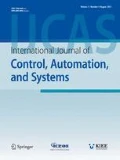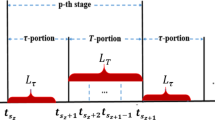Abstract
Quantization is indeed a natural way to take into consideration in the control design of the complexity constraints for the controller as well as the communication constraints in the information exchange between the controller and the plant. This paper is devoted to investigating quantized state-feedback control problems for a class of continuous-time uncertain singular Markovian jump linear systems (CUSMJLSs) with generally uncertain transition rates (GUTRs) and input quantization. In this case, each transition rate can be completely unknown or only its estimate value is known. First, input quantization is introduced, then by introducing new matrix inequality conditions, sufficient conditions are formulated for quantized state-feedback control of CSMJLUSs with GUTRs and input quantization. Finally, a numerical example is presented to illustrate the effectiveness and efficiency of the proposed results.
Similar content being viewed by others
References
S. Xu and J. Lam, Robust Control and Filtering of Singular Systems, Springer-Verlag, New York, 2006.
E. K. Boukas, Stochastic Switching Systems: Analysis and Design, Birkhauser, 2005.
X. Liu and H. Xi, “Quasi-synchronization of Markovian jump complex heterogeneous networks with partly unknown transition rates,” Int. J. Control Autom., vol. 12, pp. 1336–1344, December 2014. [click]
H. R. Karimi, “A sliding mode approach to H ∞ synchronization of master-slave time-delay systems with Markovian jumping parameters and nonlinear uncertainties,” J. Franklin Inst., vol. 349, no. 4, pp. 1480–1496, May 2012.
Y. Kao, C. Wang, and L. Zhang, “Delay-dependent robust exponential stability of impulsive Markovian jumping reaction-diffusion Cohen-Grossberg neural networks,” Neural Process. Lett., vol. 38, no. 3, pp. 321–346, December 2013. [click]
Y. Kao, J. Guo, C. Wang, and X. Sun, “Delaydependent robust exponential stability of Markovian jumping reaction-diffusion Cohen-Grossberg neural networks with mixed delays,” J. Franklin Inst., vol. 349, no. 6, pp. 1972–1988, August 2012.
Y. Kao, C. Wang, F. Zha, and H. Cao, “Stability in mean of partial variables for stochastic reaction-diffusion systems with Markovian switching,” J. Franklin Inst., vol. 351, no. 1, pp. 500–512, January 2014. [click]
Y. Li and Y. Kao, “Stability of stochastic reaction-diffusion systems with Markovian switching and impulsive perturbations,” Math. Probl. Eng., vol. 2012, pp. 1–13, September 2012.
Z. Chen and Q. Huang, “Exponential L 2-L ∞ filtering for a class of stochastic system with Markovian jump parameters and mixed mode-dependent time-delays,” Int. J. Control Autom., vol. 12, no. 3, pp. 552–563, February 2012.
E. K. Boukas, Control of Singular Systems with Random Abrupt Changes, Springer, Berlin, 2008.
Y. Ding, H. Zhu, S. Zhong and Y. Zhang, “L 2-L ∞ filtering for Markovian jump systems with time-varying delays and partly unknown transition probabilities,” Commun. Nonlinear Sci. Numer. Simulat., vol. 17, no. 7, pp. 3070–3081, July 2012. [click]
S. Ma and E. K. Boukas, “A singular system approach to robust sliding mode control for uncertain Markov jump systems,” Automatica, vol. 45, no. 11, pp. 2707–2713, November 2009. [click]
G. Wang and Q. Zhang, “Robust control of uncertain singular stochastic systems with Markovian switching via proportional-derivative state feedback,” IET Control Theory Appl., vol. 8, no. 8, pp. 1089–1096, May 2011.
J. Wang, H. Wang, A. Xue, and R. Lu, “Delay-dependent H ∞ control for singular Markovian jump systems with time delay,” Nonlinear Anal. Hybrid Syst., vol. 8, pp. 1–12, May 2013. [click]
L. Wu, P. Shi, and H. Gao, “State estimation and slidingmode control of Markovian jump singular systems,” IEEE Trans. Automat. Control, vol. 55, no. 5, pp. 1213–1219, May 2010.
Z. Wu, J. H. Park, H. Su, and J. Chu, “Stochastic stability analysis for discrete-time singular Markov jump systems with time-varying delay and piecewise-constant transition probabilities,” J. Franklin Inst., vol. 349, no. 9, pp. 2889–2902, November 2012. [click]
L. Zhang and E. K. Boukas, “Stability and stabilization of Markovian jump linear systems with partly unknown transition probabilities,” Automatica, vol. 45, no. 2, pp. 463–468, February 2009. [click]
M. K. Song, J. B. Park, and Y. H. Joo, “Stability and stabilization for discrete-time Markovian jump fuzzy systems with time-varying delays: partially unknown transition probabilities case,” Int. J. Control Autom., vol. 11, no. 1, pp. 136–146, February 2013. [click]
M. Karan, P. Shi, and C. Kaya, “Transition probability bounds for the stochastic stability robustness of continuous-and discrete-time Markovian jump linear systems,” Automatica, vol. 42, no. 12, pp. 2159–2168, December 2006. [click]
L. Zhang and J. Lam, “Necessary and sufficient cnditions for analysis and synthesis of Markov jump linear systems with incomplete transition descriptions,” IEEE Tran. Autom. Contr., vol. 55, no. 7, pp. 1695–1701, July 2010.
L. Zhang, E. K. Boukas and J. Lam, “Analysis and synthesis of Markov jump linear Sstems with time-varying delays and partially known transition probabilities,” IEEE Tran. Autom. Contr., vol. 53, no. 10, pp. 2458–2464, November 2008.
E. Tian, D. Yue, and G. Wei, “Robust control for Markovian jump systems with partially known transition probabilities and nonlinearities,” J. Franklin Inst, vol. 350, no. 8, pp. 2069–2083, October 2013.
Y. Wei, J. Qiu, H. R. Karimi, and M. Wang, “A new design H ∞ filtering for continuous-time Markovian jump systems with time-varying delay and partially accessible mode information,” Signal Process., vol. 93, no. 9, pp. 2392–2407, September 2013. [click]
L. Zhang and E. K. Boukas, “Mode-dependent H ∞ filtering for discrete-time Markovian jump linear systems with partly unknown transition probability,” Automatica, vol. 45, no. 6, pp. 1462–1467, June 2009. [click]
Y. Ding, H. Zhu, S. Zhong, and Y. Zhang, “Exponential mean-square stability of time-delay singular systems with Markovian switching and nonlinear perturbations,” Appl. Math. Comput., vol. 219, no. 4, pp. 2350–2359, November 2012. [click]
Q. Ma, S. Xu, and Y. Zou, “Stability and synchronization for Markovian jump neural networks with partly unknown transition probabilities,” Neurocomputing, vol. 74, no. 17, pp. 3403–3411, October 2012.
J. Tian, Y. Li, J. Zhao, and S. Zhong, “Delay-dependent stochastic stability criteria for Markovian jumping neural networks with mode-dependent time-varying delays and partially known transition rates,” Appl. Math. Comput., vol. 218, no. 9, pp. 5769–5781, January 2012. [click]
J. Lin, S. Fei, and J. Shen, “Delay-dependent H ∞ filtering for discrete-time singular Markovian jump systems with time-varying delay and partially unknown transition probabilities,” Signal Process., vol. 91, no. 2, pp. 277–289, February 2011.
Y. Guo and Z. Wang, “Stability of Markovian jump systems with generally uncertain transition rates,” J. Franklin Inst., vol. 350, no. 9, pp. 2826–2836, November 2013. [click]
R. W. Brockett and D. Liberzon, “Quantized feedback stabilization of linear system,” IEEE Trans. Automat. Control, vol. 45, no. 7, pp. 1279–1289, July 2000.
B. Zheng and G. Yang, “Decentralized sliding mode quantized feedback control for a class of uncertain large-scale systems with dead-zone input,” Nonlinear Dynam., vol. 71, no. 3, pp. 417–427, February 2013. [click]
M. Fu and L. Xie, “The sector bound approach to quantized feedback control,” IEEE Trans. Automat. Control, vol. 50, no. 11, pp. 1698–1711, November 2005.
E. Tian, D. Yue, and X. Zhao, “Quantised control design for networked systems,” IET Control Theory A., vol. 1, no. 6, pp. 1693–1699, November 2007.
S. Yun, Y. Choi, and P. Park, “H 2 control of continus-time uncertain linear with input quantization and matched disturbances,” Automatica, vol. 45, no. 10, pp. 2435–2439, October 2009. [click]
W. Che and G. Yang, “Discrete-time quantized H ∞ filtering with quantizer ranges consideration,” Proc. of 2009 American Control Conference, pp. 5659–5664, December 2009.
C. Peng and Y. Tian, “Networked H ∞ control of linear systems with state quantization,” Inform. Sciences, vol. 177, no. 24, pp. 5763–5774, December 2007. [click]
N. Xiao, L. Xie, and M. Fu, “Stabilization of Markov jump linear systems using quantized state feedback,” Automatica, vol. 46, no. 10, pp. 1696–1702, October 2010. [click]
Y. Li, P. Zhang, Y. Kao, and H. R. Karimi, “Quantized state-feedback stabilization for delayed Markovian jump linear systems with generally incomplete transition rates,” Abstract and Applied Analysis, vol. 2014, Article-ID 961925, May 2014.
Y. Kao, J. Xie, and C. Wang, “Stabilization of singular Markovian jump systems with generally uncertain transition rates,” IEEE Transactions on Automatic Control, vol. 59, no. 9, pp. 2604–2610, September 2014.
J. Xiong and J. Lam, “Robust H 2 control of Markovian jump systems with uncertain switching probabilities,” Internat. J. Systems Sci, vol. 40, no. 3, pp. 255–265, March 2009. [click]
L. Xie, M. Fu, and C. E. de Souza, “H ∞ control and quadratic stabilization of systems with parameter uncertainty via output feedback,” IEEE T. Automat. Contr., vol. 37, no. 8, pp. 1253–1256, August 1992.
Z. Wu, H. Su, and J. Chu, “H ∞ filtering for singular Markovian jump systems with time delay,” Int. J. Robust Nonlinear Control, vol. 20, no. 8, pp. 939–957, May 2010. [click]
S. Xu, P. V. Dooren, R. Stefan, and J. Lam, “Robust stability and stabilization for singular systems with state delay and parameter uncertainty,” IEEE T. Automat. Contr., vol. 47, no. 7, pp. 1122–1128, July 2002.
Author information
Authors and Affiliations
Corresponding author
Additional information
Recommended by Associate Editor Yingmin Jia under the direction of Editor Yoshito Ohta. This work was supported by the National Natural Science Foundations of China (61473097) and the Qingdao Postdoctoral Application Research Project (2015117).
Jing Xie received B.S., M.S. and Ph.D. degrees from Ocean University of China in 2009, 2012 and 2015, respectively. She is a Lecturer at the College of Automation Engineering in Qingdao University of Technology, Qingdao, China. Her research interests include singular Markovian jumping systems, sliding mode control and so on.
Yong-Gui Kao received the B.E. degree from Beijing Jiaotong University in 1996. He received his M.E. and Ph.D. degrees from Ocean University of China, in 2005 and 2008, respectively. He is now an Associate Professor at Department of Mathematics, Harbin Institute of Technology (Weihai). His research interest covers stochastic systems, impulsive systems, singular systems, Markovian jumping systems, artificial intelligence, neural networks, stability theory and sliding mode control.
Cai-Hong Zhang received her B.S. degree from Ludong University, Yantai, China in 2004, her M.S. and Ph.D. degrees from Ocean University of China, in 2007 and 2011, respectively. From September 2009 to September 2010, she was a visiting scholar at University of Minnesota Duluth, USA. She is a Lecturer at the College of Automation and Electrical Engineering of Qingdao University, Qingdao, China. Her research interests include nonlinear control and model theory.
Hamid Reza Karimi received the B.Sc. (First Hons.) degree in power systems from the Sharif University of Technology, Tehran, Iran, in 1998, and the M.Sc. and Ph.D. (First Hons.) degrees in control systems engineering from the University of Tehran, Tehran, in 2001 and 2005, respectively. He is currently a professor of Applied Mechanics with the Department of Mechanical Engineering, Politecnico di Milano, Milan, Italy. His current research interests include control systems and mechatronics. He is currently the Editor-in-Chief of the DESIGNS (MDPI Switzerland) and an Editorial Board Member for some international journals, such as the IEEE TRANSACTIONS ON INDUSTRIAL ELECTRONICS, the IEEE TRANSACTIONS ON CIRCUIT AND SYSTEMS I: REGULAR PAPERS, the IEEE/ASME TRANSACTIONS ON MECHATRONICS, IEEE TRANSACTIONS ON SYSTEMS, MAN, AND CYBERNETICS: SYSTEMS, Information Sciences, the IEEE ACCESS, IFAC-Mechatronics, Neurocomputing, the Asian Journal of Control, the Journal of The Franklin Institute, the International Journal of Control, Automation, and Systems, the International Journal of Fuzzy Systems, the International Journal of e-Navigation and Maritime Economy, and the Journal of Systems and Control Engineering. He is also a member of the IEEE Technical Committee on Systems with Uncertainty, the Committee on Industrial Cyber-Physical Systems, the IFAC Technical Committee on Mechatronic Systems, the Committee on Robust Control, and the Committee on Automotive Control. He is a Senior Member of IEEE and awarded as the 2016 Web of Science Highly Cited Researcher in Engineering.
Rights and permissions
About this article
Cite this article
Xie, J., Kao, YG., Zhang, CH. et al. Quantized control for uncertain singular Markovian jump linear systems with general incomplete transition rates. Int. J. Control Autom. Syst. 15, 1107–1116 (2017). https://doi.org/10.1007/s12555-014-0171-8
Received:
Revised:
Accepted:
Published:
Issue Date:
DOI: https://doi.org/10.1007/s12555-014-0171-8




